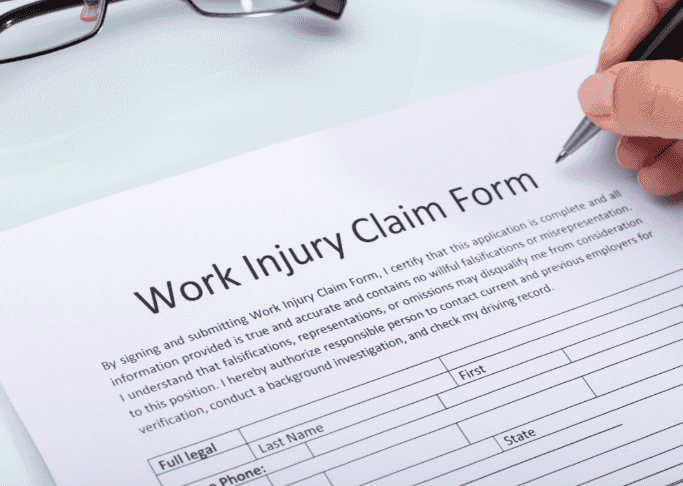
Andrey_Popov // Shutterstock
Workers Comp for Remote Employees: FAQs
For many Americans, COVID-19 transformed work life. Almost two years after the pandemic began, about 6 in 10 workers in the U.S. who said that their jobs could be mainly done from home were working remotely most or all of the time, according to a February 2022 Pew Research Center survey.
What hasn't changed, though, is the importance of knowing your rights as a remote worker—that includes understanding how workers' compensation can apply in telework.
To that end, Simply Business compiled tips that address workers' compensation for remote work based on information from the Occupational Safety and Health Administration and other online resources.
Workers' compensation is a program mandated by most state governments that provides benefits to workers who have fallen ill or become injured on the job. At its core, it is a disability insurance program for staffers.
Benefits will vary by state and policy, but may include covering medical costs, rehabilitation costs, recompensation for lost wages, or some combination of the three for employees who have sustained work-related injuries or illness.
Continue reading for answers to some commonly asked questions that may arise about workers' compensation in a remote working environment, such as what sort of coverage remote workers could have, what typically counts as a work-related injury in this environment, and how employers can help in preventing injuries from occurring at home offices.

Bezuglova Evgeniia // Shutterstock
Do you need workers’ comp for remote employees?
Yes, you do need worker’s compensation insurance for remote workers. In general, if an employee contracts an illness or suffers an injury arising out of and during the course of employment, it is covered under workers' compensation—regardless of the location in which the injury or illness has occurred. This said, to claim workers' compensation, employees must prove they were acting in the employer's interest when the injury happened.
When it comes to safety-related obligations for employees generally, employers should think about how they can ensure they are providing an environment that's safe for their employees in accordance with the Occupational Safety and Health Act.
Doing so means they've fulfilled their legal obligation to ensure work sites are safe. This obligation extends to employees working from home as well, though the scope of the employer’s responsibility depends on the type of work their employees are doing.
Workers' compensation benefit requirements vary by state. In 2015, the loss of an arm was worth up to $440,000 in Illinois, $193,950 in Ohio, and $48,840 in Alabama, respectively. Given how much state requirements can vary, it's important for employers to work with their legal counsel and workers' compensation carriers to determine how to handle workers' compensation risks when it comes to the telecommuters who work for them.
WORKERS COMPENSATION COVERAGE
Protect your team with an insurance offering that provides worker’s compensation to injured employees. Learn more about business insurance with worker’s compensation and get covered in just minutes.

Studio Romantic // Shutterstock
What counts as a work-related injury in teleworking?
Work-related injuries while teleworking only count if the injury happened as the result of an accident that occurred "in the course of" and "arising out of" employment. In other words, it must have occurred while the employee was performing work, for compensation or pay, in their home.
Even more than this, the injury (or sickness, in the case of an ailment) must have been related directly to the performance of the work—instead of to the general setting or environment of the home.
For instance, if an employee hurts their foot while working because they dropped a work item they were carrying, this may count as a work-related injury. However, if they trip over their dog while going from one room to another to answer a call for work and hurt their foot, this likely would not count as a work-related injury.

JeSleiter // Shutterstock
How can employers prevent injuries for employees working remotely?
OSHA will generally not inspect employees' home work spaces. However, employers can give some tips for employees to keep home workstations safe. To do this, employers might consider creating a written handout or recording a YouTube video where they cover safe electrical setups and how to set up equipment in an ergonomic way within a home office.
Additional recommended best practices include establishing a communication mechanism such as a hotline remote employees can call for assistance and developing a checklist to address safety issues that employees complete periodically. Another good practice involves regularly training employees (typically at onboarding and on an annual basis) so they're aware of their obligations to report their work illnesses and/or injuries and also how to report them.
For those who telecommute and work remotely in the federal government, agencies might have requirements that require those employees to complete safety checklists where they self-certify that their home office has no hazards. It's important to note that the intent of such a checklist must be for purposes of the program—like introducing the employee to workplace safety—and not for liability and legal purposes.

Rawpixel.com // Shutterstock
How should employers address home injuries?
Employers should be aware of what's required for recordkeeping from a remote work perspective. From a compliance and legal standpoint, when an employee tells their employer they sustained an injury while working from home, the employer should get as much information as possible about the details of the incident, such as the nature of their injury, the activity that occurred before the injury, and the date and time when the injury happened.
Gathering this information should be done as soon after the incident as possible; once the employer has done this, they should pass it along promptly to their insurance carrier. This allows the employee and insurance adjuster to have follow-up discussions while the details of the matter are still fresh.
Certain injuries are required to be reported to the OSHA. These injuries are generally more serious in nature and may include loss of consciousness, medical treatment that is beyond first aid, transfer to a different job or restricted work, days the employee must spend away from work, or death.
Even if an injury does not result in any of these aforementioned results, an injury may still be reportable to the OSHA when a physician or another licensed medical professional diagnoses the injury involved in the case as being a significant injury.

Written by
Elisa Fernández-Arias
This content is for general, informational purposes only and is not intended to provide legal, tax, accounting, or financial advice. Please obtain expert advice from industry specific professionals who may better understand your business’s needs. Read our full disclaimer
INSURANCE
Business InsuranceGeneral Liability InsuranceWorkers Compensation InsuranceProfessional Liability InsuranceErrors & Omissions InsuranceSole Proprietors Workers CompensationCyber InsuranceSelf-Employed InsuranceBUSINESSES
Contractors InsuranceCleaners InsuranceE-commerce InsuranceHandyman InsuranceHome Improvement Contractor InsuranceLandscaping InsuranceLawn Care InsurancePhotographers InsuranceABOUT
About usContact UsCareersSite MapInsurance ProvidersSIMPLY U
General BusinessProtect Your BusinessStart Your BusinessADDRESS
Simply Business1 Beacon Street, 15th FloorBoston, MA02108
LEGAL
Terms & ConditionsPrivacy PolicyPrivacy Notice for CA ResidentsResponsible Disclosure PolicyDo Not Sell or Share My Personal Information (CA Residents)*Harborway Insurance policies are underwritten by Spinnaker Insurance Company and reinsured by Munich Re, an A+ (Superior) rated insurance carrier by AM Best. Harborway Insurance is a brand name of Harborway Insurance Agency, LLC, a licensed insurance producer in all 50 states and the District of Columbia. California license #6004217.
© Copyright 2024 Simply Business. All Rights Reserved. Simply Business, LLC is a licensed insurance producer in all U.S. States and the District of Columbia. Simply Business has its registered office at Simply Business, 1 Beacon Street, 15th Floor, Boston, MA, 02108. In California, we operate under the name Simply Business Insurance Agency, LLC, License #0M20593. In Colorado, we operate under the name Simply Business, LLC DBA Simply Business Insurance Agency. In New York, we operate under the name Simply Business Insurance Agency. In Pennsylvania, we operate under the name Simply Business Insurance Agency, LLC. In Texas, we operate under the name, U.S. Simply Business, LLC. For more information, please refer to our Privacy Policy and Terms & Conditions.